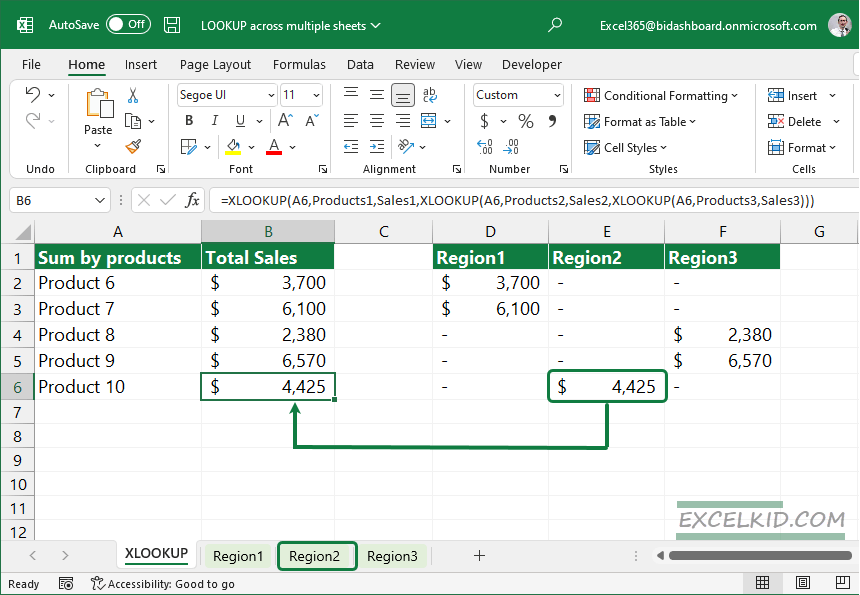5 Ways to Master VLOOKUP Across Two Excel Sheets

One of the most powerful tools in Microsoft Excel, VLOOKUP, allows users to search for a value in one column and retrieve a corresponding value from another column. Mastering VLOOKUP is essential for anyone working with data, especially when you need to combine information from two different sheets. Here are five advanced techniques to help you become an expert at using VLOOKUP across two Excel sheets.
Understanding VLOOKUP Basics

Before diving into advanced techniques, let's ensure a solid understanding of the VLOOKUP function:
- Function Syntax:
=VLOOKUP(lookup_value, table_array, col_index_num, [range_lookup]) lookup_value- The value you want to look up.table_array- The range of cells containing the lookup value and return value.col_index_num- The column number in the table from which to retrieve the value.range_lookup- An optional parameter whereFALSEindicates exact match andTRUEfor approximate match.
1. Cross-Sheet VLOOKUP


The first step to mastering VLOOKUP across sheets is understanding how to reference another sheet in your VLOOKUP formula. Here’s how to do it:
- Select the cell where you want the result to appear.
- Type
=VLOOKUP(lookup_value,. - Click on the second sheet, select the table range, and Excel will automatically add the sheet reference, e.g.,
Sheet2!A2:B10. - Finish typing the rest of the formula:
,3,FALSE)assuming you want to retrieve the third column's data with an exact match.
🔍 Note: The lookup range must be in the source sheet, not the active sheet where the formula is entered.
2. Dynamic Column Index

Instead of hardcoding the column index number, you can make it dynamic. This is especially useful if the structure of your data might change:
- Use the
MATCHfunction in combination with VLOOKUP to dynamically find the column number: =VLOOKUP(lookup_value, Sheet2!A:B, MATCH("Column Header", Sheet2!1:1, 0), FALSE)
3. VLOOKUP with Array Formula

Sometimes, you need to look up multiple values simultaneously. Here’s how you can extend VLOOKUP using an array formula:
- Select the cells where you want the results.
- Enter the formula:
=VLOOKUP(lookup_values,Sheet2!A2:B10,{1,2},FALSE)- Press Ctrl + Shift + Enter to create an array formula.
💡 Note: Array formulas are tricky and require exact syntax; always double-check them for correct formatting.
4. Error Handling in VLOOKUP

VLOOKUP can return errors when no match is found or when cells contain errors. Here’s how to handle these:
- Use
IFERRORfunction to catch and handle errors: =IFERROR(VLOOKUP(lookup_value, Sheet2!A2:B10, 2, FALSE), "Not Found")
5. Combining with Other Functions for Complex Lookups

VLOOKUP can be enhanced by combining it with other functions for more complex data retrieval:
- Using INDEX and MATCH: For more flexible lookups or when VLOOKUP falls short.
=INDEX(Sheet2!B:B, MATCH(A2,Sheet2!A:A, 0))
Table: Comparison of VLOOKUP vs. INDEX & MATCH

| Feature | VLOOKUP | INDEX & MATCH |
|---|---|---|
| Speed | Slower, especially with large datasets | Faster |
| Column Insertion | Can break if columns are inserted | Remains stable with column additions |
| Lookup Direction | Vertical lookups only | Can do both vertical and horizontal lookups |
| Flexibility | Limited to the left-most column for lookup | More flexible with lookup criteria |

By mastering these techniques, you can leverage VLOOKUP to its fullest potential, making your data management tasks in Excel more efficient and error-free. Remember, the key to becoming proficient in Excel is practice and understanding the underlying principles of how functions interact with each other.
With these methods, you'll be well-equipped to handle almost any data retrieval task in Excel. VLOOKUP, when combined with other functions and tailored to different scenarios, can transform the way you work with data, enhancing productivity and accuracy in your daily tasks.
Can VLOOKUP look up values to the left in Excel?

+
No, VLOOKUP cannot naturally look to the left. To overcome this, you can either reorganize your data or use functions like INDEX & MATCH, which provide more flexibility.
What should I do if VLOOKUP returns a #N/A error?

+
This error means the lookup_value was not found in the first column of the table_array. Check for data mismatches, such as extra spaces or different number formats, or use the IFERROR function to handle the error gracefully.
How can I make VLOOKUP case-sensitive?

+
VLOOKUP is not case-sensitive by default. For case-sensitive lookups, you can combine EXACT, MATCH, and INDEX functions to achieve this result.